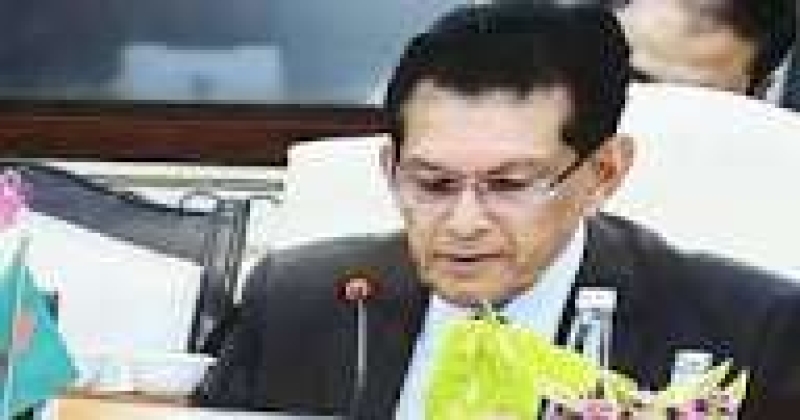- UNGA urges renewed int’l efforts for a resolution of Rohingya crisis |
- First National AI Readiness Assessment Report Published |
- China calls for implementation roadmap for new finance goal |
- New gas reserve found in old well at Sylhet Kailashtila field |
- Revenue earnings shortfall widens in October |
Dhaka warns CSC against exogenous, indigenous interference

Bangladesh on Thursday pledged its readiness to work hand in hand to ensure a “stable, secure, peaceful and prosperous” Indian Ocean region and to confront the common challenges, stressing that they do not afford to allow any exogenous or indigenous forces.
“We do not afford to allow any exogenous or indigenous forces to challenge the security and well-being of our community and any part thereof,” said National Security Adviser (NSA) Dr Khalilur Rahman while delivering the country statement at the 7th meeting of the National Security Advisers (NSAs) of the Colombo Security Conclave (CSC) in New Delhi.
Dr Rahman said they continue to stand ready to find common grounds to address common issues based on mutual trust and openness.
Bangladesh, India and other Member States sat together in New Delhi to promote closer cooperation on vital matters of security and strengthen partnership for enhancing regional security in the Indian Ocean region.
India hosted the 7th meeting of the National Security Advisers (NSAs) of the Colombo Security Conclave (CSC).
Indian NSA Ajit Doval hosted his counterparts from Member States including Maldives, Mauritius, Sri Lanka and Bangladesh.
Seychelles participated as an Observer State, and Malaysia was invited as a Guest.
Dr Rahman who led the Bangladesh delegation at the CSC said Bangladesh looks at the Conclave to evolve into an open, inclusive regional multilateral organisation, driven by a vision of open regionalism.
He said Bangladesh recognises the importance of the five identified pillars of the Conclave's work and the important role that CSC can play along these pillars in enhancing collective security, regional stability and shared prosperity for all members of the region.
Dr Rahman said Bangladesh has been steadfastly playing its dual role in this regard and they are working alongside regional nations to enhance maritime safety and security, combat piracy and other organised maritime crimes and terrorism, as well as to ensure cybersecurity.
“Bangladesh has consistently condemned global terrorism. We have a zero-tolerance policy towards all forms of terrorism, under any circumstance,” he said.
With growing digitalisation and technological developments, including artificial intelligence, Dr Rahman said, the menace of cybercrime is affecting all their countries. “Cybersecurity is thus a high priority in Bangladesh.”
Of late, he said, they have been facing constant barrage of misinformation and disinformation. “We are committed towards securing our own cyberspace, critical infrastructure and technology, not only for the safety of our citizens.”
However, he said, national actions are not enough and they have already heard this point from other speakers of this forum.
“We need to articulate and implement our collective actions in facing up to the challenges of cybersecurity, misinformation and disinformation, and I look forward to CSC’s actions in this regard,” Dr Rahman said.
“As we navigate the complexities of regional security, let us reaffirm our commitment to uphold the principles of mutual trust and respect, mutuality of interests and sharing of benefits,” he added.
Dr Rahman expressed sincere thanks to the National Security Adviser of India for convening the seventh NSA-level meeting in New Delhi of the Colombo Security Council, and for the warm welcome and hospitality accorded to Bangladesh delegation.
Bangladesh also noted the impressive report of the Secretary General of CSC on the activities of the Organization.
Dr Rahman noted that Bangladesh has been participating in some of the CSC activities and will continue to do so in the future, based on the principles enshrined in the Charter of the organization, namely sovereignty, equality, territorial integrity and non-interference.
In keeping with this vision and objective, the 7th meeting of the NSAs is seen an opportunity for the participants to review the activities under the different pillars of cooperation, namely- maritime safety and security; countering terrorism and radicalisation; combating transnational organised crime; cyber security and protection of critical infrastructure and humanitarian assistance and disaster relief, and discuss the roadmap and action plan for 2026, said the host country- India.
Earlier, National Security Adviser (NSA) Dr Khalilur Rahman on Wednesday met his Indian counterpart Doval in New Delhi.
“They discussed work of the CSC (Colombo Security Conclave) and key bilateral issues,” said an official at the Bangladesh High Commission in New Delhi.
Dr Rahman invited Doval to visit Bangladesh at his convenience.
Dr Rahman reached New Delhi on Tuesday night at the invitation of National Security Adviser of India Ajit Doval to attend this regional forum.
We don’t afford to allow any exogenous or indigenous forces: Dhaka tells CSC
The 6th meeting of the NSAs of CSC was held in December 2023 in Mauritius, and Member States met again during the Signing Ceremony for the Founding Documents of CSC in Sri Lanka in August 2024.
The Deputy National Security Advisers (DNSAs) of CSC countries have also been meeting at regular intervals.
The CSC’s core objective is to promote regional security by addressing transnational threats and challenges of common concern to the Member States.
NSA Dr Rahman’s participation at the Colombo Security Conclave in New Delhi is in continuation of the interim government's efforts to foster mutually beneficial regional cooperation, Bangladesh said.
The interim government emphasises regional cooperation as a priority and has actively participated in meetings of various regional bodies.
In April this year, Chief Adviser Prof Muhammad Yunus was elected Chair of BIMSTEC. He has been working hard to reactivate SAARC, said the press wing.
NSA Dr Rahman earlier led a Bangladesh delegation to the China-Indian Ocean Region Forum in Kunming, China.
Bangladesh was officially welcomed in 2024 as the fifth Member State of the Colombo Security Conclave (CSC), a grouping that includes India, Sri Lanka, Mauritius and the Maldives. Seychelles participates with observer status, reports UNB.

